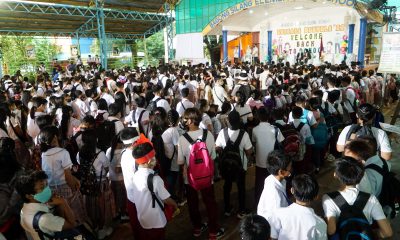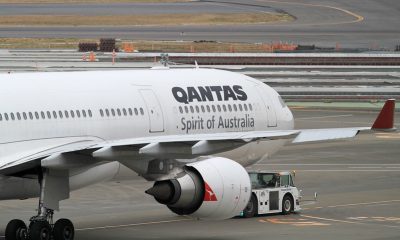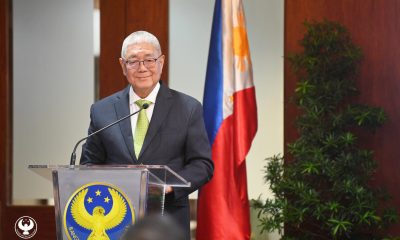Breaking
ICAEW: PHL to see greater infrastructure investments in 2015
Strong public finances will allow the Philippines to pursue more infrastructure projects in 2015 with GDP growth estimated at 6.2%, according to ICAEW’s latest Economic Insight report. However, a brain drain issue is depriving the nation of talent and this could be reversed with greater internationalisation within industry sectors.
Economic Insight: South East Asia is produced by Cebr, ICAEW’s partner and economic forecaster. Commissioned by ICAEW, the report provides its 144,000 members with a current snapshot of the region’s economic performance. It undertakes a quarterly review of South East Asian economies, with a focus on Indonesia, Malaysia, the Philippines, Singapore, Thailand and Vietnam.
The recent collapse in the global oil prices has resulted in cancellations of mining projects in commodity-rich and oil-exporting ASEAN nations like Indonesia and Malaysia. However, this has also allowed ASEAN governments to channel fuel subsidies to other areas of investment. Already at the top of their agenda are improving education and infrastructure, and now is an opportune time to pursue them.
Charles Davis, ICAEW Economic Advisor and Cebr Director, said: “ASEAN governments have implemented a variety of strategies to raise their national output in order to cope with global challenges. These mainly lie in raising labour productivity, or increasing the size of the labour force.
“In terms of labour force, the Philippines is faced with a brain drain issue, which is depriving the labour pool of much of its greatest talent. This has been a problem for a while now, with the country having lost an estimated 10% of its population to work abroad, including many highly qualified professionals.”
While the Philippine economy is partly compensated through remittances, most of the productivity gains accrue to the developed economies in which these emigrants live. While it can’t compete with higher wages in Singapore or the United States, the Philippines could follow in the footsteps of other Asian countries which have successfully reversed similar brain drain challenges and seen emigrants returning in large numbers.
Mark Billington, Regional Director, ICAEW South East Asia, said: “As we have seen, in China and India for example, emigrants are willing to return to their home countries despite even wage cuts, so long as they are confident their sector of expertise exists. One key strategy will be to make sure that the Philippines’ high-tech industrial centres are integrated into relevant international networks; this means that people can return to their home nation without fearing that their career progression will suffer.
“Good infrastructure is also going to be vital. It allows clusters of new industries to develop, which is crucial to maximize the potential of sectors of the workforce that are already highly-educated and qualified, and encourages entrepreneurship. Other incentives, such as providing grants for the right new businesses, will also help.”
Strong public finances have enabled the Philippines to place a new focus on infrastructure investments in 2015. The Philippines public-private partnership (PPP) centre has approved construction projects worth $24.5 billion, which could contribute greatly to infrastructure improvements.
In other parts of ASEAN, productivity across all major economies showed strong growth from 1991 to 2012. Vietnam stood out with a remarkable 184% growth over this period, equivalent to a 5% increase per year. However, as ASEAN economies progress and move into the next phase of development, education is becoming an important determinant of productivity. With the exception of Singapore, workforces in ASEAN are predominantly unskilled and greater emphasis on higher education is required as a tier of more highly skilled jobs is created.
Long-term planning and investment now is pivotal to ASEAN’s ability to improve future
performance and prepare itself for deceleration and a shift to domestic consumption-led growth in the coming years. The region’s response now must involve developing the skills that can replace commodities as sources of export earnings.
Other findings in the report include:
• President Joko Widodo’s fuel subsidy reform shows promise in Indonesia
Indonesia axed a large fuel subsidy scheme worth $21bn in November, and is channelling its resources for investments in other areas. This suggests that its new president can deliver on his manifesto promises. Other areas of improvement include more regulation and policy in the area of tax and governance, and mandating all entities to produce financial reports annually.
• Malaysia’s planned goods and services tax (GST) continues to spark debate
Consumers in Malaysia were recently reported to be the least confident in the region; a fact attributed in part to the GST which takes effect in April. Many Malaysians are concerned that the tax will put upward pressure on the inflation rate. Growth in GDP is expected to be at 4.6% in 2015.
• Business confidence in Singapore falls to its lowest level since 2013
Global and regional factors, including a slowdown in global trade volumes due to the stagnation of Japan and Europe and the cooling of growth in China were cited for this decline. The Monetary Authority of Singapore (MAS) also unexpectedly eased monetary policy, following recent moves towards looser policy by several other major central banks, constraining the appreciation of the Singapore dollar.
• Vietnam shows strong fiscal outlook with close to 6% growth in 2014, boosted by a 13.6% gain in exports
Vietnam continues to cement its place as a major electronics producer, gaining cost advantage over China and its rising wages. Samsung has increased its direct investment in the economy by around 40% to $12bn. The government’s credit ratings were also raised last year. However, the fall in oil prices now threatens its fiscal position.
The full report Economic Insight: South East Asia is available at www.icaew.com/economicinsight and a video summary can be viewed here.






















